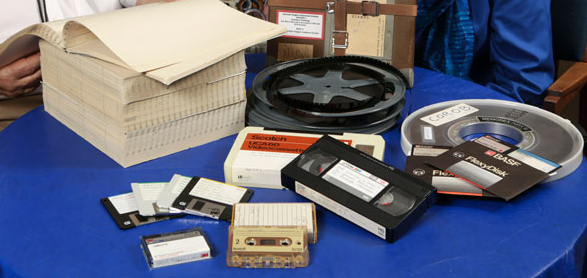Summary: Some vital (and generally useful) documents are sitting in out-of-date file formats. UAH is helping the cause.
Article on Dr. Charles Lundquist's and UAH's Agony and Ecstasy with restoring old NASA documents from outdated technologies
BLOT: (05 Jul 2013 - 10:16:58 AM)
Article on Dr. Charles Lundquist's and UAH's Agony and Ecstasy with restoring old NASA documents from outdated technologies
One of the frailties of old data is that it is bound to its format du jour: paper reams, magnetic reels, photographic negatives, handwritten journals, audio-cassettes, and so forth. While most of the data, and a fair amount of its various media, is still viable, the impact of time is a danger on two fronts: (1) obsolescence of technology and (2) ever-marching decay. Key research, sometimes with only a few copies ever extant, can rot away in a decade while waiting for someone to have the tools to organize it and the capability to understand it and to transition it to a more accessible medium. Take this story into consideration:
"I'll give you an example," Dr. Lundquist says. "Just before the Apollo program, NASA launched some satellites that went around the moon to prepare for the coming lunar landing. They got some really good high-resolution cameras from the Dept. of Defense and took a lot of pictures of the moon.
"Now, all these images were stored on magnetic tape, and their full resolution was used to look at potential landing sites. But NASA only did the high-resolution data reduction on the few sites they had selected for landing sites, to see what was there."
The tapes were stored at the Jet Propulsion Laboratory. As time passed, the machines used to read the tapes were declared surplus and sold. A project worker, realizing they may have future value, bought three and stored them in her garage.
Fast-forward to 2004, when President George W. Bush set a goal for NASA to return to the moon. Suddenly, images recorded to prepare for Apollo had new value as a way to compare the moon's craters and features with those from 40 years earlier for a possible new landing.
It almost couldn't happen. NASA had no way of reading the tapes.
"A UAH graduate named Dennis Wingo managed to track down that lady who had bought those machines," Dr. Lundquist said. "He bought them and got a contract with NASA to refurbish them. Much of their electronics had to be replaced and they were covered with dust and mildew from sitting for 30-plus years in that garage."
That excerpt is from "Archivists race technology to save past research, records" (uah.edu), which talks about Dr. Charles Lundquist's, and many others', race to save lots of data from technical loss and physical decay. It is worth a read. To help dial it home, take a look at this close up of all the different types of storage that has this data that Lundquist is trying to recover:

One of the digital paradoxes, as stated by Jeff Rothenberg, "Digital documents last forever, or five years, whichever comes first." Another problem1, and I'm basing this on anecdotal evidence, is that data tends to outlast its ability to be read. We have writing we had to reteach ourselves the language (and in a few cases, we've never relearned the context). We have floppy disks laying around from our childhood. We have old Word files that look like garbage upon being converted/opened. We hold on to them all, and sometimes we get to see them again. Certainly true in the data that Lundquist is looking at.
I'm going to be helping with a little bit of it. Thinking about volunteering to help with even more. It sounds fun, and really important. And a bit of a lesson about the dangers of stocking up on a technology without having a graceful segue to the next stage of its evolution.
1: If not a paradox, since it makes a degree of sense that we might hold on to out-of-date data at a low cost while keeping up the technology for indefinite years can have a great cost, but it still makes for interesting moments in information science.
OTHER BLOTS THIS MONTH: July 2013
dickens of a blog




Written by Doug Bolden
For those wishing to get in touch, you can contact me in a number of ways

This work is licensed under a Creative Commons Attribution-ShareAlike 3.0 Unported License.
The longer, fuller version of this text can be found on my FAQ: "Can I Use Something I Found on the Site?".
"The hidden is greater than the seen."

